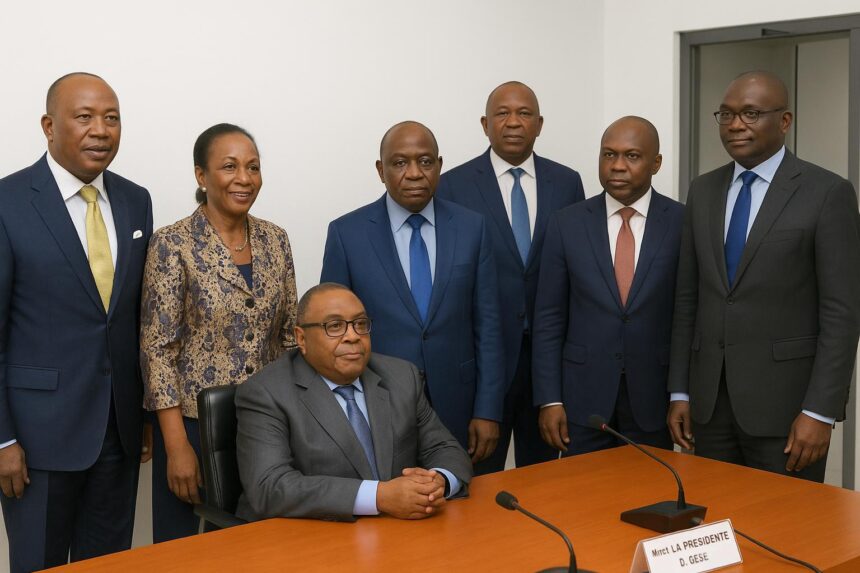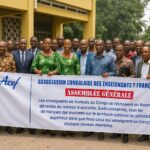A Quiet Yet Significant Transition
With little fanfare but considerable symbolism, a presidential decree signed in Brazzaville this month refreshed the top table of the Economic, Social and Environmental Council, the constitutional body that connects civil society expertise to the desks of national decision-makers.
The ceremony of handover, held before presidential adviser Rodrigue Malanda Samba, confirmed Minister Emilienne Raoul in the chair while presenting three new officers whose combined backgrounds span disability advocacy, macro-economics and public administration—a mix observers say could sharpen the Council’s analytic edge.
Beyond personalities, the reshuffle is read in diplomatic circles as another signal that President Denis Sassou Nguesso intends to keep participatory consultation alive during the delicate phase of post-pandemic recovery and the implementation of Congo’s 2022-2026 National Development Plan.
Profiles of the New Leadership Team
Vice-president Jean de Dieu Goma arrives after leading the Consultative Council for Persons with Disabilities, where he forged alliances with municipal authorities and international donors such as the United Nations Development Programme, cultivating a reputation for methodical negotiation and measured advocacy.
Economist Hyacinthe Defoundoux, now rapporteur, taught fiscal policy at Marien Ngouabi University and contributed to the African Development Bank’s 2022 Country Diagnostic, lending him insight into the revenue diversification challenges highlighted by the latest IMF Article IV consultations.
Questor Arsène Mokoma comes from the Ministry of Territorial Administration, where colleagues recall his emphasis on transparent procurement and on-time salary payments—competences that matter in an institution whose annual budget, modest by regional standards, still finances nationwide hearings and thematic studies.
Completing the picture, former interim rapporteur-questor Louis Patrice Ngangon formally transferred hundreds of pages of pending recommendations, including an environmental risk mapping exercise prepared with French think tank Iddri, underscoring the Council’s attempt to bridge domestic deliberation and comparative expertise.
Mandate and Strategic Outlook
Under article 157 of the Constitution, the Council’s mission is advisory; however, its opinions increasingly feed into cabinet memoranda, as illustrated by the 2021 report on informal-sector resilience that informed tax reform clauses in the current Finance Act (Les Dépêches de Brazzaville).
Officials close to the Prime Minister’s office note that draft decrees related to climate finance and the Congolese Creative Industries Fund are already in the Council’s pipeline, giving the new team early opportunities to demonstrate professional cohesion.
Internal working groups, the president revealed, will be structured around the five pillars of the national plan: industrial diversification, human capital, digital transition, environmental stewardship and administrative modernisation, giving each councillor a clear thematic anchor.
Madame Raoul reminded her colleagues that visibility remains a strategic objective; according to a 2022 Afro-Barometer survey, only 27 percent of urban respondents could identify the Council’s role, a statistic she described as a ‘gap we must close through territorial outreach and digital seminars’.
Budget analysts in the Ministry of Finance underscore that stronger public awareness could attract targeted donor funding for consultative missions, reducing pressure on the state treasury without compromising the principle of national ownership laid out in the 2022-2026 Development Plan.
Democratic Participation in Practice
Jean de Dieu Goma framed the Council as ‘a classroom of citizens’ where structured dialogue pre-empts social tension, echoing the participatory governance doctrine championed by the African Union’s Agenda 2063, to which Congo is a signatory.
In practical terms the body stages public hearings that invite agricultural cooperatives, youth associations and women entrepreneurs to critique draft legislation before it reaches parliament, an approach praised last year by the UN Economic Commission for Africa during its sub-regional workshop in Pointe-Noire.
Such interactions, observers add, can diffuse complaints over subsidy reforms or land-use zoning before they crystallise into street protests, aligning with the President’s stated preference for ‘anticipatory dialogue over reactive policing’ voiced during his 2022 state-of-the-nation address.
Critics occasionally question the non-binding nature of the Council’s advice, yet government officials argue the model fosters consensus, citing the swift acceptance of its 2020 recommendations on pandemic support to micro-enterprises, now credited with preserving over 15,000 jobs (IMF country report).
Regional and International Resonance
Regional diplomats note that Congo’s consultative architecture resembles the French Economic, Social and Environmental Council, allowing Brazzaville to exchange methodologies with Paris and Rabat under existing cooperation accords and to showcase home-grown inclusivity during multilateral peer reviews.
This alignment could prove advantageous as Congo prepares its next Voluntary National Review to the UN High-Level Political Forum, a process where stakeholder consultation is weighted heavily in assessments of Sustainable Development Goal progress.
Diplomatic sources in Libreville suggest that peer institutions across the Central African Economic and Monetary Community are watching the Brazzaville experiment closely, eager to replicate any practices that help governments reconcile fiscal consolidation with rising social expectations.
For now, the Council’s refreshed leadership holds a mandate both technical and symbolic: to convert granular citizen input into policy advice that sustains economic stabilisation and social cohesion, reinforcing the soft power of participatory governance that Congo is gradually projecting across Central Africa.






















